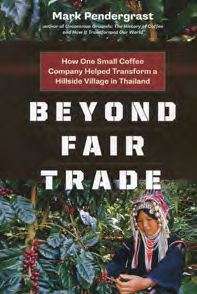SEJournal Online is the digital news magazine of the Society of Environmental Journalists. Learn more about SEJournal Online, including submission, subscription and advertising information.

BookShelf
"Beyond Fair Trade: How One Small Coffee Company Helped Transform a Hillside Village In Thailand"
By Mark Pendergrast
Greystone Books, $18.95
Reviewed by JoANN M. VALENTI
“Compassionate capitalism” sure sounds suspiciously wonky during a political campaign season, but brace yourself for a credible example.
In “Beyond Fair Trade: How One Small Coffee Company Helped Transform a Hillside Village in Thailand,” author Mark Pendergrast offers a convincing story that a multinational partnership can deliver shared profits (maybe) and provide sustainable farming for a marginalized tribe in a challenging mountain environment.
Pendergrast has a penchant for exploring the business of beverages (see his “Uncommon Grounds: The History of Coffee and How It Transformed Our World” and “For God, Country, and Coca Cola”). Now he’s back to coffee in a narrative about a once-migrant tribe, showcasing his skill at weaving history, culture, economics and environmental science in a mere 290 pages.
The tribe, the Akha, eagerly abandoned the CIA/USAID-supported opium poppy trade for organic Arabica coffee beans in a deal with a wealthy Canadian businessman. The Doi Chaang Coffee Company launched in Canada in 2007.
One of the book’s key characters is Canadian hedge funder John Darch, a complicated figure who made his millions in mining and banking. His bond with the Akha representative Wicha Promyong, a savvy blend of monk/hippy/venture capitalist, becomes an intimate story within the story.
Darch is convinced he has an alternative capitalism model: equitable profit for growers and roasters. It helps that the Akha are peaceful workaholics. The Akha Way combines spiritual rituals, shamans, a mostly patriarchal yet egalitarian lifestyle and a wealth of oral myths with a history of crop rotation and a willingness to work with machetes on a steep Thai mountainside.
Fortunately, their new crop plan attracted the attention of a university agronomist, who taught the tribe how to plant and harvest productive trees. The Akha memorized her lessons because they lack a written language.
As adept farmers, the Akha readily mastered the crop. Be prepared, for instance, to learn the ultimate secret of premium coffee: wild civet cat poop. A civet looks like a skinny raccoon but has a digestive system that makes its fecal output gold to coffee growers. Rather than cage the civets and collect their poop, the Akha simply allow the cats to roam the groves and eat the fallen beans.
Although the Akha continue to face stiff competition in the world of fine roasted coffee, and struggle to reap the promised profits, they’ve wisely diversified their income stream by also marketing honey-scented soaps.
As the book concludes, with the author moving to journal-style first person to share his thoughts about his final research trips and conversations, you’ll be left wanting even more follow-up on the Akha and this compassionate capitalist.
JoAnn M. Valenti is an emerita professor of communications at Brigham Young University, a founding SEJ academic member and an SEJournal editorial board member.
* From the quarterly news magazine SEJournal, Spring 2016. Each new issue of SEJournal is available to members and subscribers only; find subscription information here or learn how to join SEJ. Past issues are archived for the public here.












 Advertisement
Advertisement 



